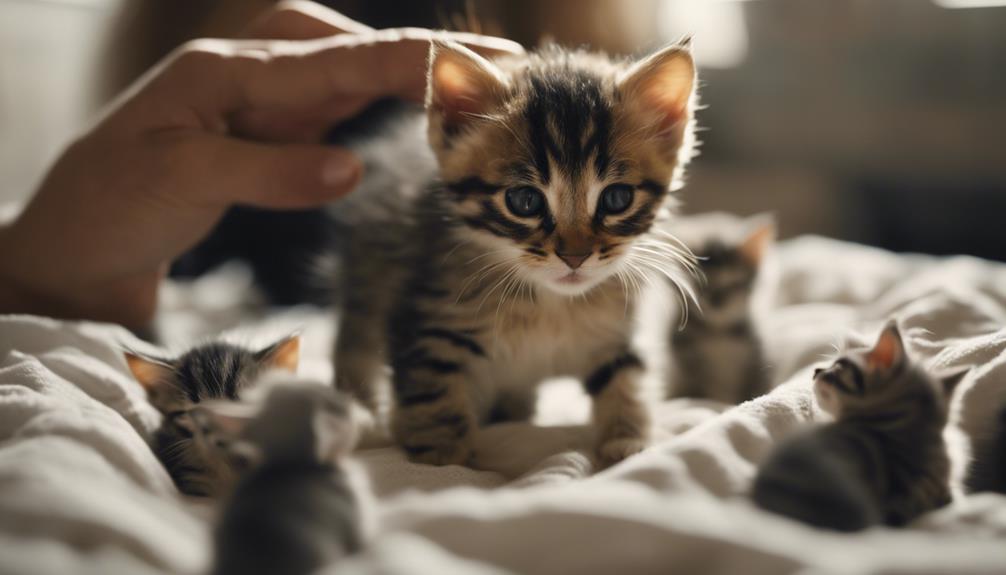As kitten season approaches, animal shelters across the country are gearing up to welcome an influx of newborn cats in need of care and homes. This period, characterized by a surge in feline populations due to breeding patterns, presents a critical opportunity for individuals to make a difference in the lives of these vulnerable animals.
By exploring the unique advantages of adopting during kitten season and the ways in which one can support shelters, readers can discover meaningful ways to contribute to the well-being of these tiny felines.
Key Takeaways
- Kitten season brings in newborn cats, ideal for adoption.
- Shelters receive litters of kittens during this time.
- Adopting during kitten season provides homes for many cats.
- It's a perfect time to find your new feline companion.
Understanding Kitten Season Timing
During the varying months of the year, the timing of kitten season is contingent upon the lengthening of days and environmental cues that trigger breeding in outdoor cats. Typically, as days become longer, female cats go into heat, leading to increased mating behaviors. This phenomenon often results in an influx of kittens being born, with kitten season lasting from March to November in many regions.
It's crucial to understand that outdoor female cats can have multiple litters in one season, contributing significantly to the population of homeless cats. Being aware of these timing factors can help communities and shelters prepare for the challenges associated with kitten season and strategize ways to support and manage the influx of kittens effectively.
Ways to Help During Kitten Season
To support the feline community during kitten season, it is essential to provide assistance in various ways. One crucial way to help is by not disturbing newborn kittens in outdoor nests, allowing their mother to care for them undisturbed.
Providing food, water, or shelter for outdoor kittens can also make a significant difference in their well-being. If you come across kittens in poor health, contacting local shelters is advisable for professional help.
Additionally, supporting spaying and neutering efforts is vital in preventing future litters and controlling the cat population. By contributing to Trap-Neuter-Return (TNR) programs, you can help ensure a healthier environment for cats and reduce the spread of diseases associated with overpopulation.
Importance of Fostering and Support

Fostering kittens plays a crucial role in providing temporary care and support during the peak of kitten season. By opening their homes to foster kittens, individuals help alleviate overcrowding in shelters, allowing more cats to receive the necessary care and attention they need.
Fostering also provides a nurturing environment for kittens to grow and develop social skills before they are ready for adoption. Additionally, fostering helps shelters save on resources, such as food and medical supplies, which can then be allocated to other animals in need.
The support of foster families is invaluable in ensuring that each kitten receives the love and care required for a healthy start in life.
The Role of Donations in Shelters
A pivotal aspect of sustaining shelters and supporting their operations is through generous donations from the community and animal welfare advocates. Donations play a crucial role in ensuring that shelters can provide necessary care, food, medical treatment, and shelter for the animals in their care. Here is a breakdown of how donations can make a difference:
| Impact of Donations | Description |
|---|---|
| Medical Care | Funds go towards veterinary expenses for sick animals. |
| Food and Supplies | Donations help in providing nutritious food and essential supplies. |
| Shelter Maintenance | Support is used for maintaining clean and safe shelter environments. |
| Staffing Costs | Donations can contribute to paying staff for their hard work. |
| Educational Programs | Funds support community education on responsible pet ownership. |
Benefits of TNR Programs

Donations play a crucial role in sustaining the operations of shelters, particularly in supporting essential services like medical care and staff wages, which also extends to programs such as Trap-Neuter-Return (TNR).
TNR programs offer various benefits that contribute to the well-being of both the cat population and the community:
- Compassion: TNR programs show compassion towards feral cats by providing them with necessary medical care and preventing future suffering.
- Community Health: By reducing the number of feral cats through TNR, these programs help control the spread of diseases within the cat population and protect the health of other animals.
- Environment: TNR programs aid in maintaining a balanced ecosystem by managing the cat population in a humane and effective way.
- Human-Animal Bond: Supporting TNR initiatives fosters a positive relationship between humans and animals, promoting a more harmonious coexistence.
Spaying and Neutering Guidelines
Implementing spaying and neutering guidelines is essential in controlling the cat population and promoting responsible pet ownership.
Spaying refers to the surgical removal of a female cat's ovaries and uterus, while neutering involves the removal of a male cat's testicles. These procedures not only prevent unwanted litters but also offer health benefits such as reducing the risk of certain cancers and behavioral issues.
It is recommended to spay or neuter cats before they reach sexual maturity, which can be as early as 2 months of age. By adhering to spaying and neutering guidelines, individuals can help address the issue of cat overpopulation and contribute to a healthier feline community.
Advantages of Adoption During Kitten Season

During Kitten Season, adopting a newborn cat can bring joy and companionship into your home while also providing a loving forever home for a kitten in need. Here are four emotional advantages of adoption during this special season:
- Saving a Life: By adopting a kitten during Kitten Season, you are directly saving a life and giving a deserving animal a chance at a happy future.
- Creating Memories: Adopting a kitten during this time allows you to create lasting memories filled with love, playfulness, and adorable moments that will bring joy to your life.
- Making a Difference: Choosing to adopt during Kitten Season makes a significant impact on reducing shelter populations and giving kittens a second chance at a loving home.
- Unconditional Love: Adopting a kitten means welcoming unconditional love and companionship into your life, forming a special bond that can bring immense happiness and fulfillment.
Preparing for a New Kitten
As you prepare to welcome a new kitten into your home during Kitten Season, ensuring a smooth transition for both you and your furry companion is essential. Setting up your home with the necessary supplies and making it kitten-proof are crucial steps. Here is a helpful table to guide you through the preparations:
| Supplies | Description | Importance |
|---|---|---|
| Litter Box | Provide a designated toileting area | Essential for hygiene |
| Food and Water Bowls | Offer a consistent feeding schedule | Promotes good health |
| Bed or Blanket | Create a cozy resting spot | Comfort and security |
| Toys | Encourage play and exercise | Mental stimulation |
| Scratching Post | Redirect scratching behaviors | Protects furniture |
Tips for First-Time Adopters

Embarking on the journey of adopting a kitten for the first time requires careful consideration and preparation to ensure a smooth transition for both you and your new feline companion. Here are some essential tips for first-time adopters:
- Patience: Adjusting to a new environment can be overwhelming for a kitten, so be patient as they settle in.
- Consistency: Establish a routine for feeding, playtime, and litter box training to create a sense of security for your new furry friend.
- Affection: Show love and affection to build trust and a strong bond with your kitten.
- Education: Take the time to learn about cat care, behavior, and health to provide the best possible life for your new companion.
Providing a Forever Home
When considering adopting a kitten, ensuring a forever home is established is paramount for their well-being and happiness. Providing a forever home involves a lifelong commitment to the care, love, and well-being of the kitten.
It is essential to create a safe and comfortable environment that meets the kitten's physical and emotional needs. This includes setting up a designated area with food, water, litter box, toys, and a cozy bed. Regular veterinary check-ups, vaccinations, and spaying or neutering are also crucial aspects of responsible pet ownership.
Building a strong bond through playtime, affection, and positive reinforcement helps foster a trusting relationship. By providing a forever home, you are giving a kitten a chance for a happy and fulfilling life.
Frequently Asked Questions
What Are Some Common Signs That a Female Cat Is in Heat During Kitten Season?
During kitten season, common signs of a female cat in heat include increased vocalization, restlessness, affection-seeking behavior, and assuming a mating position. Understanding these signs can help in identifying when a cat is in heat.
How Can Individuals Help Outdoor Cats Who Have Given Birth to Kittens but Are Unable to Care for Them?
Individuals can assist outdoor cats unable to care for newborn kittens by providing food, water, and shelter. Contacting local shelters for assistance with kittens' health is crucial. Supporting TNR programs and spaying/neutering initiatives helps control the cat population and prevent overpopulation.
Are There Any Specific Requirements or Qualifications for Individuals Interested in Fostering Kittens During Kitten Season?
Individuals interested in fostering kittens during kitten season typically need to undergo a screening process by shelters. Requirements may include providing a safe environment, time commitment for care, and willingness to follow guidelines set by the shelter to ensure the kittens' well-being.
How Do Shelters Determine Which Animals Receive Priority for Medical Treatment and Care Based on Donations?
Shelters prioritize animals for medical treatment based on urgency and available resources. Donations often support critical care needs such as surgeries, medications, and specialized treatments. Allocation decisions aim to maximize the impact of funds on animal welfare.
What Are Some Potential Risks or Complications Associated With Spaying and Neutering Kittens at a Young Age?
Spaying and neutering kittens at a young age can pose risks like delayed growth, anesthetic complications, and urinary issues. Proper veterinary care and monitoring are crucial to mitigate these risks and ensure a successful procedure.
Is it safe to adopt a kitten during kitten season if it hasn’t completed its vaccination schedule?
It’s important to consider the kitten vaccination schedule chart before adopting a kitten during kitten season if it hasn’t completed its vaccinations. Waiting until the vaccination schedule is complete can help ensure the kitten’s health and safety as it grows and develops.
Conclusion
In conclusion, kitten season brings about a surge in cat populations, creating a crucial time for shelters and rescue organizations to care for and find homes for newborn felines.
By understanding the timing of kitten season, supporting fostering efforts, donating to shelters, promoting TNR programs, and advocating for responsible pet ownership, individuals can play a significant role in managing the cat population and providing loving homes for kittens in need.




